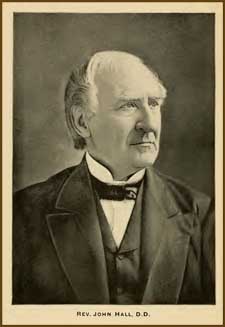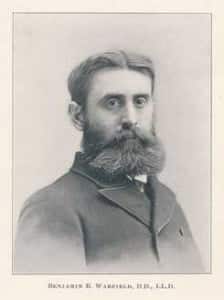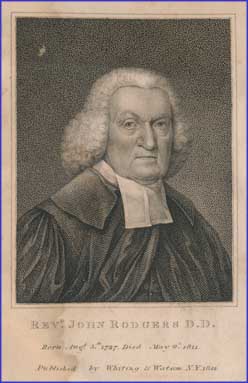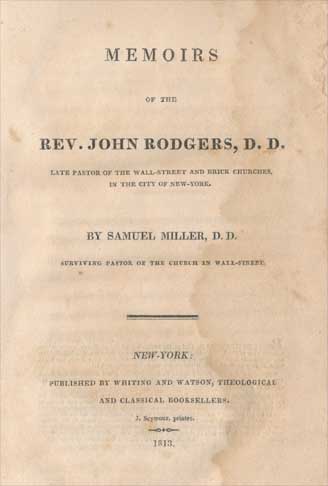Wisdom from the Past: Should We Help the Exiles?
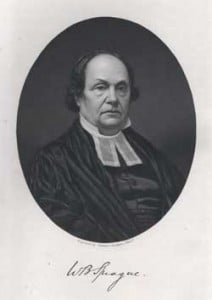 It was on this day, May 11th, in 1834, that the Rev. William Buell Sprague preached in the Second Presbyterian Church of Albany, New York, a sermon that Sabbath evening on behalf of Polish exiles who had recently arrived in the United States. Driven from their homeland, these twenty-six exiles now sought refuge in our country, but had arrived destitute and in urgent need of aid. Rev. Sprague was asked to preach on their behalf in an effort to raise the funds needed for their assistance.
It was on this day, May 11th, in 1834, that the Rev. William Buell Sprague preached in the Second Presbyterian Church of Albany, New York, a sermon that Sabbath evening on behalf of Polish exiles who had recently arrived in the United States. Driven from their homeland, these twenty-six exiles now sought refuge in our country, but had arrived destitute and in urgent need of aid. Rev. Sprague was asked to preach on their behalf in an effort to raise the funds needed for their assistance.
There are clear differences between the situation then confronting Rev. Sprague and his audience, and the situation which has in recent times consumed our headlines. For one, there were but twenty-six of these Polish exiles arriving on our shores, not thousands. And their stated intent was to become “worthy and useful citizens” who would readily adopt our laws and our ways. Nonetheless, the following is offered with the thought that perhaps there is here some wisdom that we can glean for contemporary application.
The sermon is based upon the text of Hebrews 13:3, “Remember them that are in bonds as bound with them, and them which suffer adversity as being yourselves also in the body.” and Rev. Sprague opens his sermon in this way;
The apostle commences this chapter by exhorting the Hebrew Christians to the general duty of brotherly love. In the passage just read, he reminds them particularly of their obligations to administer, according to their ability, to the relief of those oppressed brethren whose attachment to the Christian faith had subjected them to persecution and imprisonment; and, as an argument for the discharge of this duty, he alludes to the consideration that they and their afflicted brethren possessed a common nature, and were alike subject to human calamity. You will, I think, readily perceive that the passage suggests a train of thought not inappropriate to the present occasion.
Sprague quickly moves to the first point of his sermon, that Christians have a duty of charity to those in need:
I. Let us contemplate, for a moment, the DUTY which the text enjoins: it is charity to the wretched and necessitous.
That duty, he notes, is an active duty. Another property of Christian charity is that it is enlightened. We are not called to an indiscriminate duty of charity. Rather, our charity is to be guided by Scripture and by prayer. Then too, Christian charity is to be “controlled in its operations by a regard to the will of God:
In a gust of natural feeling, you may give all your goods to feed the poor, and this act may place you high on the list of earthly benefactors; and yet, if it be not done from a regard to the will of God, it can never turn to your account as an act of genuine Christian philanthropy.
Our duty thus underscored, Sprague then moves to the Apostle’s argument, “drawn from the fact that we are all partakers of a common nature; members of the same great family.”—”Remember them that suffer adversity, as being yourselves also in the body.” Sprague notes that “The fact that we are in the body, and inhabitants of this world of sorrow, is a sufficient reason why we should always live in expectation of adversity.”
Moreover,
In a world abounding with changes like the present, no man can say that his prosperity will last for an hour; or that the person who is now the object of his charity may not soon be administering charity to him. The best security you can have against being neglected or forsaken in the day of adversity, is to show yourself always the friend of suffering humanity.
Rev. Sprague then moves to address the particulars of the subject in view, these Polish exiles and how it is that they have come to this country:
They chose America; and hither they have come in all their want and wretchedness; and their presence this evening must, I am sure, call into exercise your liveliest sympathies. Let it be remembered that they are not vulgar and uneducated men, who were born to the prospect of a life of penury; on the contrary, they are men of considerable intellectual culture, of high and honorable feelings, and some of them are connected with families of rank, and have been accustomed to move in circles of distinction. . . The idea of asking charity exceedingly revolts their feelings, notwithstanding the iron pressure of their necessities; and that what they most of all desire is, that they may be furnished with some employment, no matter how humble it may be, by means of which they may provide for their own subsistence. They come to find a refuge among us from the bloody horrors of a most disastrous revolution; and they come, of course, in all the want and wretchedness of exiles; but they bring with them a spirit of subordination and industry, and a determination to render themselves worthy and useful citizens.
Reminding his hearers of the reasons why they should extend their charity to these men, Sprague continues:
Remember too, that you are the children of those who embarked their fortunes and their lives in a bloody conflict for freedom; and that if Heaven had not been propitious in giving them the victory, you might yourselves have been the sons of slaves, groaning under the hand of oppression, or perhaps flying to the ends of the earth for an asylum.
Moreover,
Remember also, that though you live in a free country, you live in a mutable world; and the day may come when even the grave of American liberty shall be dug; and this land shall drink the blood of its own inhabitants; and the glory of our republican institutions shall be trampled in the dust; and you or your children be chained to a despot’s car, and grace a despot’s triumph. I do not predict such an event; and I pray the God of all goodness, who has been the protector of our nation’s liberties hitherto, that it may never occur; but when I see how the spirit of revolution is abroad among the nations, and especially when I open my ear to the din of party strife which is raging on every side, I dare not say that these clouds which flit about here and there in our political atmosphere, may not, by some fearful principle of attraction, be drawn together, and concentrate in terrific blackness their angry elements, and burst upon this land in a wild storm, which shall uproot the tree of liberty which was planted at the expense of the blood of our fathers, and which had begun to yield fruit for the healing of other nations. I say again, may the merciful God avert from us this doom; but if it should be so, and the night-clouds of an ignoble bondage should come over this land, and you should be driven from your wives, and daughters, and mothers, into a foreign country, and should land upon the shores of another nation in all the depths of poverty and woe, and should be unable to tell the story of your own wrongs, say what would be so grateful to you, what would help so much to abate the anguish of recollection, as to be greeted by the spirit of Christian philanthropy; to see the stranger stepping forth to give you a brother’s hand? Put thy soul then, O man, in his soul’s stead; and by the tide of sorrowful recollection which would then press upon thee, and by the painful embarrassments which would cluster about thee,—resolve, with thine ear open to the voice of conscience, and thine eye open upon the retributions of eternity,—resolve how this appeal in behalf of thine exiled, suffering brother, shall be answered.
Words to Live By:
Sprague’s appeal on behalf of these Polish exiles was successful. His message was well received and he was even asked to deliver it again a few nights later in another church. And the crux of Rev. Sprague’s argument for extending charity to those in need comes down to this statement by our Lord Jesus Christ: “Therefore all things whatsoever ye would that men should do to you, do ye even so to them: for this is the law and the prophets.”—Matthew 7:12.
To read the whole of Rev. Sprague’s sermon delivered that May 11th in 1834,click here.

